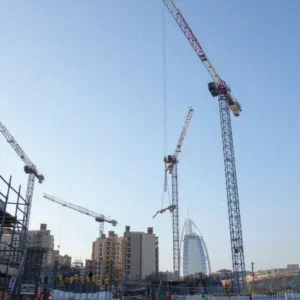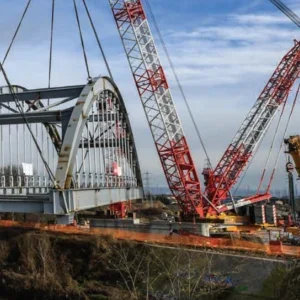When industrial conglomerate Rentokil Initial decided to dispose of a whole raft of non-core businesses, it seemed quite likely that the managers of the various crane operations might try to organise a management buyout. In fact the only part that has ended up going down this route is Aberdeen-based Sparrows Offshore Services, that part of the old Grayston White & Sparrow company that manages cranes in the offshore market.
Strictly speaking, the £10.5m ($15m) deal concluded in September is not a management buyout but an institutional buyout. Managing director Ken Scott, financial director Adrian Bannister, operations director Malcolm Wilson and engineering director David Cockburn together now own nearly 30% of the business, while venture capital company 3i owns just over 70%.
The management has strong experience. Scott and Wilson joined Sparrows Offshore on the same day in March 1980. Scott became managing director in 1986 at the age of 36, taking over from founder managing director Angus Lyon.
Sparrows Offshore was set up by GW Sparrow & Sons in 1975 to supply crane operators to British Petroleum (today called just BP). BP had bought some large American Hoist crawler cranes, taken the crawlers off, mounted them on oil rigs in the Forties Field in the North Sea and derated them for dynamic lifting, but then could not find skilled operators. Sparrows, which was supplying cranes for BP’s onshore construction yards, was asked to supply operators. From this one contract grew a business supplying the full range of crane management services. When Scott joined, it was with a specific brief to develop the crane management concept, supplying not just the operator but all maintenance, service and spare parts.
Sparrows still works for BP in the North Sea (it is BP’s longest serving contractor) and today has 82% of the UK North Sea offshore crane management market, providing craneage services on 114 installations there. This total was boosted significantly by BP’s takeover of Amoco in 1998, bringing Sparrows a lot of cranes to manage in the southern part of the North Sea.
Sparrows Offshore has 435 employees (most are based offshore) and a turnover in 1999 of £26.2m ($37m). This year’s turnover is forecast to be £28.7m.
Other clients in the North Sea include Shell UK Exploration & Production, Talisman Energy, Kerr-McGee, Amerada Hess, Conoco, Marathon, Britannia, Enterprise, Total Fina Elf and Texaco.
Scott is confident that Sparrows Offshore has a good, long term, secure future in the North Sea. The sensitivity of lifting activity, coupled with the ever increasing emphasis on standards of competence in crane management and operation, has helped the market for dedicated crane management to grow strongly over the years. He also recognises, however, that if the company is to grow, it has to widen its horizons.
“Growth opportunities in the North Sea are limited. It is now a mature province,” he says. “Developments now are subsea, where there’s not a lot of call for craneage.”
Diversification has been considered. “We looked at the potential of ports and harbours in the mid 1990s,” says Scott, “but it looked a competitive market already. So we decided to continue to concentrate our efforts on the offshore markets, and I think that’s proved to be the right decision.”
Instead the plan is to expand internationally, a goal which Scott believes will be easier for Sparrows to pursue now that it is owned by its own management and the uncertainty has been resolved.
Already it has about 10% of its business outside UK waters, with crane management contracts for Chevron off West Africa, for the Abu Dhabi state oil company Adama Opco in the Persian Gulf, and a branch operation in Perth, Australia. “We aspire to develop on that quite considerably, if we can,” says Scott.
The key target markets for Sparrows Offshore for the next three or four years are West Africa – “especially Angola where there are ultra-deep projects” – the Gulf of Mexico, and Norway, Scott says.
He reckons there is a gap in the market in Norway. There is no one in Norway offering what Sparrows Offshore offers, he says, as Norwegian oil companies have traditionally undertaken their own crane management. However, these oil companies are now looking to outsource more and more support services.






